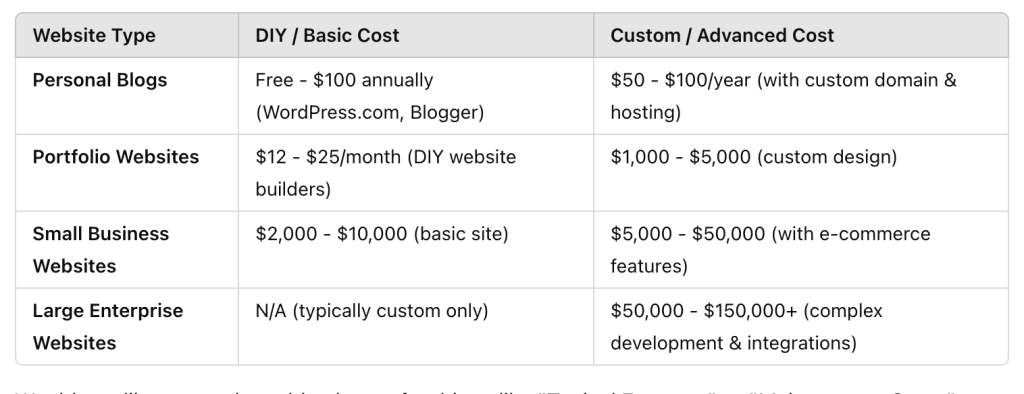Factors That Shape Website Costs
The cost of creating a website largely depends on your project’s specific needs and development approach. A basic personal blog is much cheaper than a complex e-commerce platform due to the differing levels of required functionality. While a blog may only need simple pages and minimal maintenance, an e-commerce site demands features like payment processing, inventory management, and enhanced security.
Design also plays a big role—using a template on platforms like Wix or Squarespace is affordable, but custom designs tailored to your brand will increase costs, especially when hiring professionals.
Your choice of development method matters, too. DIY builders are budget-friendly but limited, while CMS platforms like WordPress or custom-built solutions offer greater flexibility at a higher price point.
Lastly, factor in ongoing maintenance. Regular updates, security patches, and content management are essential to keeping your site functional and secure, adding to long-term costs.

The Cost Breakdown: What Goes Into It?
Here’s a streamlined breakdown of the key components that make up the total cost of a website:
Domain Name:
Your domain is your website’s unique address (e.g., www.yourbusiness.com). Domains typically cost $10–$20 per year, though premium names or certain extensions (.com, .org, etc.) may cost more. Your choice of registrar, such as GoDaddy or Namecheap, also affects pricing.
Web Hosting:
Hosting allows your website to be accessible online. Shared hosting starts at around $2.95/month and suits smaller sites. For more traffic and control, VPS hosting ranges from $20 to $80/month, while dedicated servers can exceed $300/month. Managed WordPress hosting typically costs $4 to $30/month.
Website Design:
DIY platforms like Wix, Squarespace, and GoDaddy offer plans from free (limited) to $12–$50/month, often including templates and hosting. For a fully customized design, hiring a freelancer or agency costs anywhere from $500 to $10,000+ depending on the complexity.
Development and Functionality:
Basic websites with standard features may cost $1,000 to $5,000. Advanced functionality—such as e-commerce, memberships, or custom integrations—can raise costs to $5,000 to $50,000+, depending on your needs.
Content Management System (CMS):
Open-source CMS platforms like WordPress are free, but you’ll incur additional costs for themes, plugins, and hosting. Custom CMS solutions are more expensive due to added development and licensing fees.
E-commerce Features:
Selling online? Shopify plans range from $29 to $299+/month with hosting and security included. Fully custom e-commerce development can exceed $50,000 for larger, more complex stores.
Maintenance and Updates:
DIY maintenance costs little beyond your time, while professional services—including updates, backups, and security—typically range from $50 to $300+ per month.
Want me to also condense the next section on price estimates by website type?
Average Website Costs by Type
To help you further, here are some ballpark figures based on common website types:

Other Factors That Can Increase Costs
While the above categories give a general idea, there are additional services and features that could increase your investment:
- SEO Services: Professional SEO optimization can cost anywhere from $500 to $5,000 per month depending on the competition and your growth goals.
- Content Creation: Hiring copywriters, photographers, or videographers to produce professional content will add to your upfront budget.
- Third-Party Integrations: Integrating advanced tools like marketing automation, customer support chatbots, or CRM platforms can require additional development time and licensing fees.
Real-World Examples
For small businesses, expect to spend between $145 and $640 annually for a simple website with a handful of core pages such as a homepage, service descriptions, customer testimonials, and contact info. This approach suits tradespeople, freelancers, or local shops like cafés and bars, who primarily use their website to generate leads or share practical information (e.g., menu, map, hours of operation).
For small-to-medium e-commerce sites, if you’re expanding a physical store online or launching an online-only business, the price typically ranges from $230 to $5,000, depending on how much customization you need and whether you’re building it yourself or hiring help.
On the other end of the spectrum, large-scale e-commerce websites—especially those selling hundreds or thousands of products—will require a more robust infrastructure, with budgets starting at $5,000 and easily climbing beyond $10,000.
If you’re dreaming big, like building a large bespoke business platform (think complex web applications or large-scale SaaS products), then a minimum of $15,000 is realistic, with some projects surpassing six figures when factoring in full-time design and development teams.
Jago’s Final Note on Pricing
Web designer fees, hosting prices, and domain registration rates can vary greatly depending on your location, the talent you hire, and the service packages you choose.
Don’t let accessibility barriers hold your business back.
Contact us today for an accessibility audit
Share